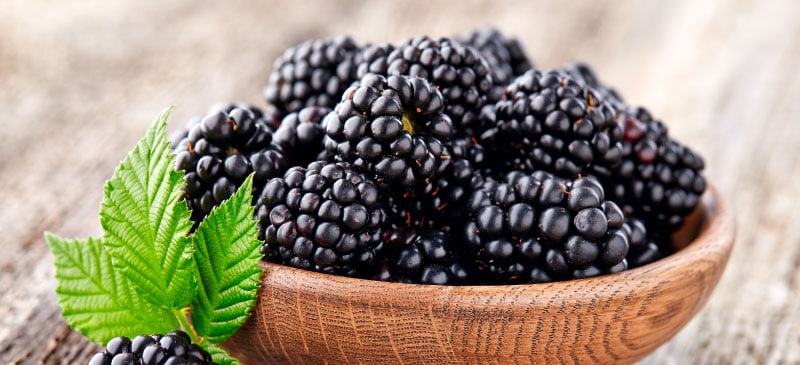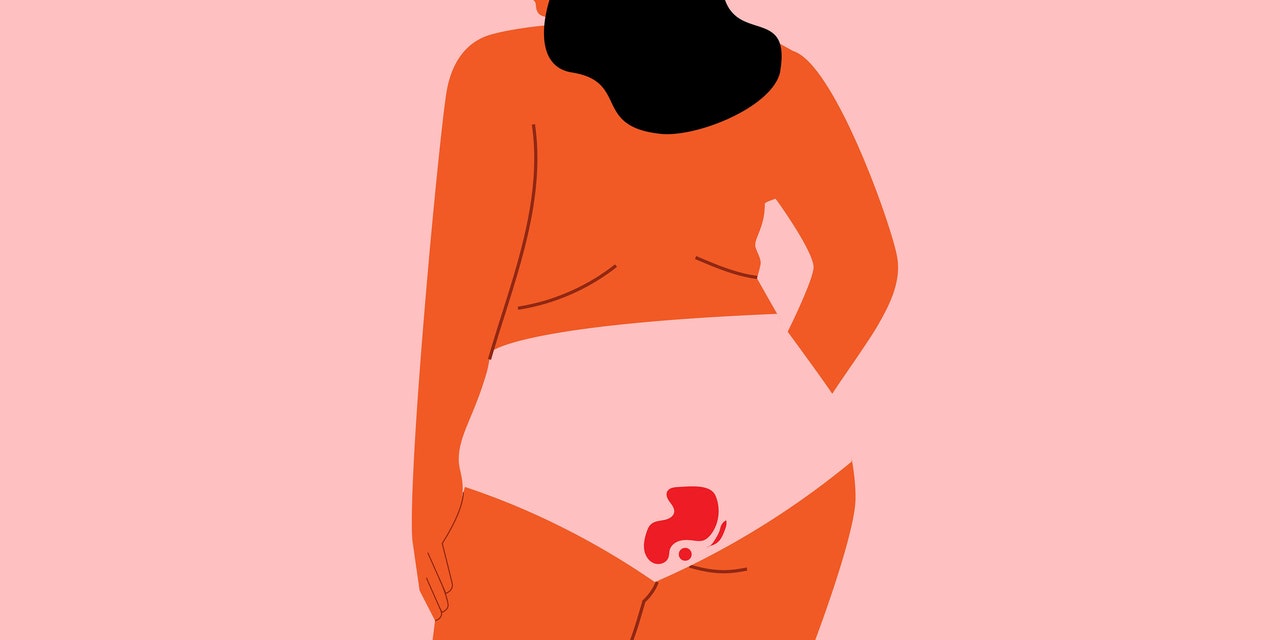
One of my favorite things to find is the intersection between delicious food and incredible health benefits. Nothing truer could be said about the health benefits of blackberries.
Boasting an ORAC score that lands it high on the most antioxidant-rich foods, as well as a list of nutrients so long it’s hard to remember even half of them plus one of the yummiest and most versatile tastes found in food, the blackberry is a fruit that I consider a “win,” no matter how you eat it.
Similar to the health benefits of blueberries, this delicate berry contains at least a third of the daily recommended value for four important nutrients and has been found to fight everything from premature skin aging to aggressive cancers. It has a rich history and, bonus, can be used in virtually any type of food.
Trust me, you should keep reading to learn all about the amazing health benefits of blackberries.
Blackberry Nutrition Facts
A member of the Rosaceae family, blackberries are produced by about seven various species in the Rubus genus and are one of the most nutrient-rich foods you can easily find.
Ad

One small serving, which contains about 15 berries, holds a whopping 30 milligrams of vitamin C and almost an entire milligram of manganese, making up about 50 percent of your daily recommended intake for both of those nutrients. Blackberries are also high in vitamin K, an essential nutrient for good bone and heart health.
In fact, blackberries rank as one of the top 10 highest-antioxidant foods, according to their ORAC value. With an ORAC score of 5,905, these tiny fruits deliver a powerful punch of antioxidants with each bite, helping you fight disease, boost immunity and maintain premium health.
Meanwhile, with only seven net carbs (total carbs minus fiber) in a cup of blackberries, it’s a natural fruit for low-carb diets like the Paleo and ketogenic diet.
Just one cup (approximately 144 grams) of these delicious berries (15–16 blackberries) contains about:
- 62 calories
- 13.8 grams carbohydrates
- 2 grams protein
- 0.7 gram fat
- 7.6 grams fiber
- 30.2 milligrams vitamin C (50 percent DV)
- 0.9 milligram manganese (47 percent DV)
- 28.5 micrograms vitamin K (36 percent DV)
- 0.2 milligram copper (12 percent DV)
- 36 micrograms folate (9 percent DV)
- 1.7 milligrams vitamin E (8 percent DV)
- 233 milligrams potassium (7 percent DV)
- 28.8 milligrams magnesium (7 percent DV)
- 308 IU vitamin A (6 percent DV)
- 0.9 milligram niacin (5 percent DV)
- 0.9 milligram iron (5 percent DV)
- 0.8 milligram zinc (5 percent DV)
- 0.4 milligram vitamin B5/pantothenic acid (4 percent DV)
- 41.8 milligrams calcium (4 percent DV)
- 31.7 milligrams phosphorus (3 percent DV)
Health Benefits of Blackberries
1. May Prevent and Slow Growth of Cancer
One of the most widely researched health benefits of blackberries is their ability to work as a cancer-fighting food. The reason for this is most likely due to the rich antioxidants found in the blackberry.
Blackberries contain polyphenols, a class of antioxidants known for their cancer-fighting abilities. Specifically, anthocyanin (a particular polyphenol) is found in high concentrations in this fruit. Anthocyanins are thought of as the primary weapon blackberries use against the development of cancer.
For example, an extract of fresh blackberry was found to exhibit tumor-preventive effects on a line of human lung cell cancer. The high levels of oxidative stress that cause the proliferation (growth) of cancer cells are blocked by the anthocyanins found in blackberries.
In regard to lung cancer, there has been at least one study demonstrating the effectiveness of cyanidin-3-glucoside, a specific anthocyanin found in blackberries, on the growth of cancerous lung tumors.
In general, blackberries are known to help prevent some of the cell mutation that leads to cancer in the first place. While the cause of cancer is complex and different for every person, the mutation of DNA and healthy cells in particular is what seems to lead to the growth of this disease, so eating antioxidant-rich foods, such as blackberries, helps suppress this mutation.
A study from UCLA in 2006 investigated the effects of six different berry varieties, including the blackberry, on the growth of oral, breast, colon and prostate cancers. Each of the six berry extracts prohibited cancer growth to some degree, urging researchers to continue looking into the impact these berries can have in treating cancer.
Vitamin K may also be a factor in the anti-cancer properties of blackberries. One serving of blackberries has over a third of the daily recommended value of vitamin K, which plays a part in helping prevent and fight prostate, colon, stomach, nasal, oral and liver cancers.
2. Improve and Maintain Brain Function
The incredible nutrient load of blackberries makes them a remarkable candidate for peak mental health. Preliminary studies focused on motor skills and short-term memory retention find that blackberries have great potential in increasing brain performance, like many other berries high in antioxidants, which is why berries are among some of the top brain foods.
Short-term memory seems most drastically improved by a consistent diet of blackberries, according to certain reports.
Manganese is one nutrient present in high levels in blackberries that’s vital to brain functioning. A notable percentage of manganese in your body is found in the synapses of your brain.
Because of the importance of manganese transmission in the brain, a manganese deficiency is linked to brain conditions like epilepsy. It’s crucial to get the proper amount of manganese in your diet in order to keep your synapses firing correctly.
Ad

It also seems that blackberries and extracted compounds from them have the ability to protect brain cells from degeneration. Once again, this is attributed to increased polyphenol concentration in the blood.
Interestingly, one particular study on this function of blackberries noted that commercial varieties of blackberries had no effect whatsoever, while wild-grown berries showed significant protective ability.
3. Reduce Inflammation, Fight Infection and Boost Immunity
Because of the antioxidants touted as one of the major health benefits of blackberries, this should be one of the main foods you consume regularly to protect your body from oxidative stress and chronic inflammation responsible for a massive number of diseases.
The natural process of inflammation is part of the body’s defense against harmful cells, but the Western diet is especially prone to encouraging chronic, disease-causing inflammation. Blackberries naturally cause a reduction in inflammation and allow your body’s processes to happen as they should, rather than on overdrive.
An example of the blackberry’s ability to fight inflammation is in its protection against stomach ulcers. One study found an 88 percent reduction in the stomach ulcers of subjects given extracted ellagitannins (a type of antioxidant) from blackberries, due to the reduced inflammation of the mucosal lining of the stomach, as well as a drop in the oxidative stress that was also partially responsible for the ulcers.
Anti-inflammatory foods often go hand in hand with foods high in antioxidants, and blackberries are no exception. As whole, healthy foods like blackberries fight inflammation and also help curb the free radical damage caused by oxidative stress within your body.
This damage occurs when the uncharged molecules (free radicals) that are responsible for aging and immune system function are overproduced due to exposure to the sun, too many processed foods or medication use. You can fight oxidative stress with antioxidants like those found in blackberries and other berries (and a ton of other amazing foods), slowing the onset or development of disease and premature aging.
Blackberries also show antibacterial activity, another function by which they protect your body from disease. They can reduce the impact of oral infections by targeting infected cells while leaving other cells untouched, making them a potentially powerful agent to treat infection.

4. Regulate Menstrual Health
If you struggle with painful symptoms of PMS, one solution might be to introduce more blackberries into your diet. The presence of vitamin K helps regulate hormone function and thereby potentially reduces cramping pains. As a blood-clotting vitamin, it can also help with excessive bleeding and give some pain relief during heavy menstrual cycles.
READ RELATED: Sea Moss: Benefits of a New Superfood
Another way to alleviate mental and physical PMS symptoms is by consuming foods high in manganese and calcium, both of which are contained in blackberries.
5. Good for the Cardiovascular System
The vitamin K in blackberries is important for the health of your entire cardiovascular system. Vitamin K serves to stop the hardening of arteries by carrying calcium out of them and preventing buildup that can lead to serious diseases.
Healthy consumption of vitamin K is also linked to healthy blood pressure levels, reduced inflammation in cells that line blood vessels (both veins and arteries) as well as a lower chance of heart attack.
In addition, another function of the anthocyanins in blackberries is their protective effects against endothelial dysfunction and heart failure. Endothelial dysfunction is a mouthful that describes a condition of the blood vessels around the heart where they’re constantly restricting and then dilating. It’s related to various forms of heart disease and associated with a high risk of heart failure or attack.
However, one special anthocyanin, cyanidin-3-O-glucoside, found in blackberries seems to do a great deal in protecting these blood vessels and may be able to significantly reduce the occurrence of this dysfunction — and, hopefully, delay or stop the onset of the related cardiovascular diseases.
6. Promote Healthy Skin
Sometimes, the health benefits of blackberries reach skin-deep, and that’s no joke. An extract of the blackberry fruit generally protects the skin from UVB damage through antioxidant activity.
It also protects the keratinocytes in your skin from UV damage, which are the cells that form a protective layer on your epidermis and then reproduce below the outer layer of skin to continually replenish the epidermis. Once again, the heroes of this story are the anthocyanins in blackberries.
The vitamin C found in blackberry nutrition also helps keep skin healthy and strong. It promotes collagen production, decreases the instance of dry skin and may even prevent premature aging of the skin.
Skin health isn’t all about preventing wrinkles, though. The nutrients in blackberries also have an antiviral effect on infections affecting the skin, specifically the herpes virus responsible for cold sores.
How to Pick and Prepare
When selecting blackberries (if you’re fortunate enough to be able to pick them wild), look for fruits that are shiny and firm. It’s also good practice to avoid fruits low enough to have been licked or partially eaten by dogs or rodents. Try searching for the freshest, best produce between August and September, making them summer fruits.
If you pick wild berries, try using several small containers to collect them, rather than stacking them in one large container, because it’s so easy to crush the drupelets that contain all of the sweet and tarty flavor.
Handpicked blackberries last about two to three days at room temperature, and refrigerating them can extend that to five to seven days, although it’s best to allow them to get to room temperature before eating. Store-bought varieties may differ in keeping time. Blackberries freeze well, so if you stock up, just remember to try freezing them in flat, single layers.
This fruit is one that’s usually important to buy organic, if you can. When studying the health benefits of blackberries, it’s not uncommon to see findings of little to no nutritional value in commercially produced, store-bought varieties in comparison with wild or organic types. You can also try a variety called marionberry.
Recipes
Blackberries are one of those incredible foods that can be used in an almost unlimited number of dishes. From salads to desserts, blackberries are a favorite for every part of your meal.
For a lunch salad or appetizer full of antioxidants and flavor, try our Blackberry Lemon Salad (with a homemade salad dressing you’re definitely going to make again).
Looking for a breakfast treat? Try this Gluten-Free Berry Muffin recipe, and with it comes all the benefits of coconut oil and almonds nutrition.
For those of us who can’t resist a healthy dessert, why not try this recipe for Vegan Blackberry Peach Ice Cream?
Although blackberries function as a fruit, they aren’t very similar to other berries — such as maqui berries or juniper berries — in composition. They’re more like peaches or almonds, which are known as drupes.
Blackberries are an “aggregate fruit,” meaning they have merged many plant ovaries in their formation. The tiny bubbles on blackberries are known as drupelets, which are what make them similar in composition to other drupes.
Many ancient cultures were aware of the health benefits of blackberries to some extent. Greeks were known to use the blackberry plant to treat gout, and Romans utilized the leaves to create a tea they claimed would treat various illnesses.
These fruits also found their place in ancient folklore as symbolic representations of a large number of things. In Christianity, sources indicate blackberries were used to symbolize spiritual neglect or ignorance.
In mid-Mediterranean literature, writers insisted Christ’s crown of thorns was made from blackberry runners and that the deep color of the juice represented the blood of the savior. Other folk stories associate blackberries with bad omens, haste and sometimes death.
Explorer, writer and botanist John Bertram was one of the first to formally record the presence of blackberries in his work for the original United States Botanical Garden, writing of the plants outside of Mobile, Ala., “[It] grows here five or six feet high, rambling like Brier vines over the fences and shrubs.”
Modern cultivation began in the late 1800s in the Americas by Judge Logan of California.
One notable fact about blackberries is that there are so many cross-cultivated varieties that it’s not possible to clarify a “taxonomy” of the original blackberry. The complexity of current species of blackberries means that there’s no way to separate out the original.
Currently, Mexico is the largest exporter of blackberries.
Risks and Side Effects
While the tannins found in the blackberry fruit are in small enough quantities to be healthy without consuming too much, there are much larger amounts found in the leaves and root of the plant, which are sometimes used to make tea.
There is some evidence that a massive load of tannins, like those in such teas, can potentially increase the size of tumors in cancer patients. People who have a history of cancer should avoid teas made from blackberry leaf or root.
It’s also good to minimize blackberry consumption if you’re susceptible to kidney stones, as the oxalates found in blackberries and various other fruits can sometimes increase the production of these stones.
Some people may experience mild allergic reactions when consuming blackberries, so if you notice a swelling or itching of your hands, mouth or lips upon eating the fruit, it’s best to discontinue use immediately.
Final Thoughts
- Blackberries are found in a large number of varieties and species all over the world, and no one can truly pinpoint the “original” variety.
- This fruit contains a long inventory of vital nutrients, many of which are found in huge quantities in just one serving, such as fiber, vitamin C, manganese and vitamin K — which is why the health benefits of blackberries are so plentiful.
- A lot of research supports the theory that blackberries and their extracted compounds are powerful cancer-fighting agents, just one of the many health benefits of blackberries.
- Many of the health benefits of blackberries are related to their high antioxidant load, especially the amount of anthocyanin polyphenols they contain.
- Blackberries are good for your brain as they help it operate at peak function and protect it from damage.
- The blackberry is an anti-inflammatory, antioxidant and antibacterial food that fights many diseases.
- Eating blackberries around the time of a menstrual cycle can help minimize cramps and other PMS symptoms.
- Blackberries also help your heart function well and your skin stay healthy, along with the other health benefits of blackberries.
- It’s important to buy blackberries organic whenever possible, as this is the best way to maintain their nutrient integrity when using them in a variety of scrumptious dishes.
!function(f,b,e,v,n,t,s)
{if(f.fbq)return;n=f.fbq=function(){n.callMethod?
n.callMethod.apply(n,arguments):n.queue.push(arguments)};
if(!f._fbq)f._fbq=n;n.push=n;n.loaded=!0;n.version=’2.0′;
n.queue=[];t=b.createElement(e);t.async=!0;
t.src=v;s=b.getElementsByTagName(e)[0];
s.parentNode.insertBefore(t,s)}(window, document,’script’,
‘
fbq(‘init’, ‘3475171552810057’);
fbq(‘track’, ‘PageView’);





